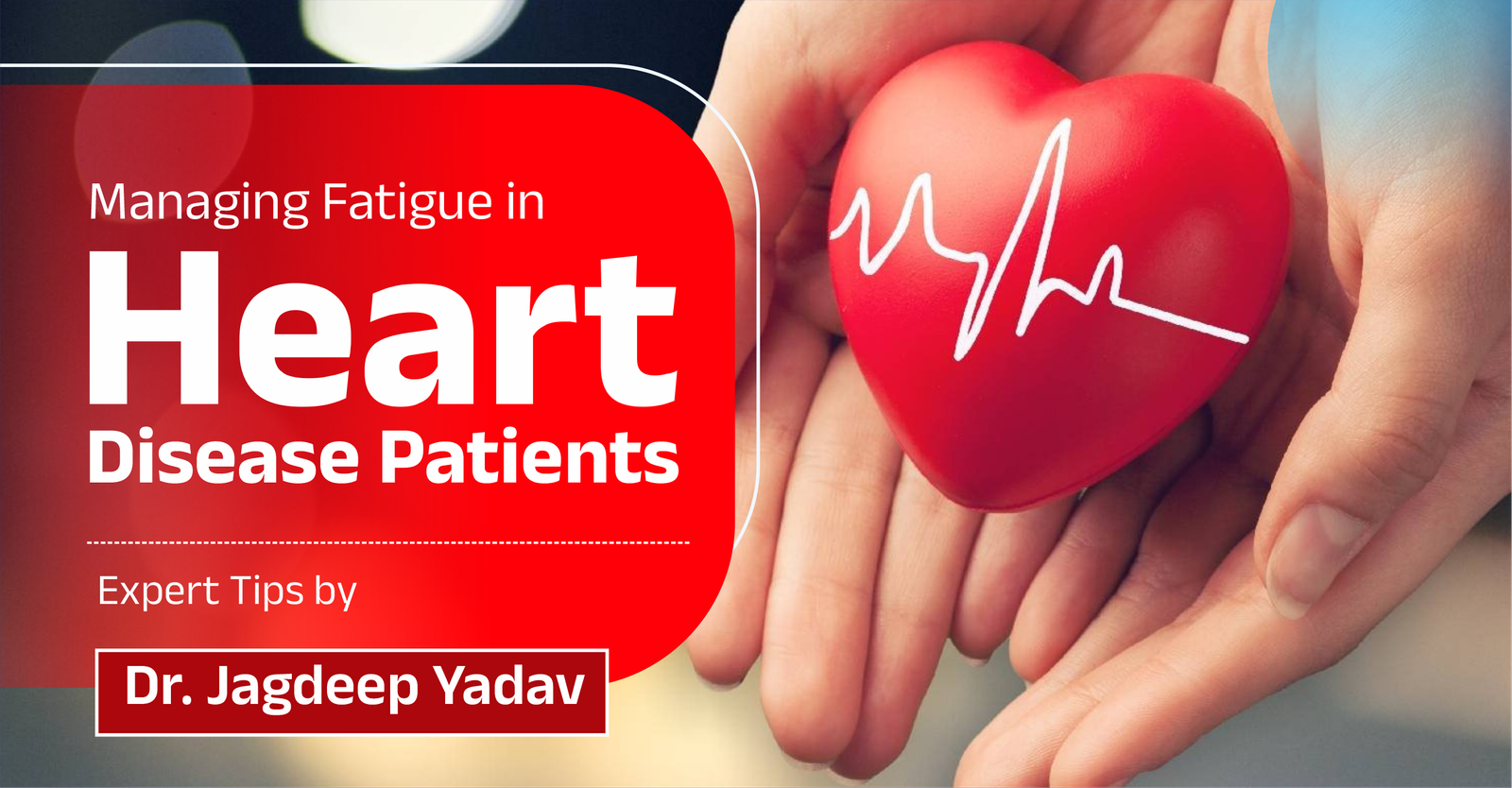Book Appoinment

Managing Fatigue in Heart Disease Patients
Insights from Dr. Jagdeep Yadav, Senior Consultant Cardiologist, Manesar & Nouveau Medics Clinic, Manesar
Fatigue is one of the most common yet overlooked symptoms in patients with heart disease. It affects daily activities, reduces quality of life, and can be an early sign of worsening heart function. Managing fatigue effectively is crucial for improving patient outcomes and maintaining overall well-being.
In this article, we explore the causes of fatigue in heart disease patients and provide expert recommendations from Dr. Jagdeep Yadav, Senior Consultant Cardiologist, Fortis Hospital Manesar & Nouveau Medics Clinic. With years of experience in treating complex cardiac conditions, Dr. Jagdeep Yadav offers valuable insights into improving energy levels and enhancing heart health.
Understanding Fatigue in Heart Disease
Fatigue in heart disease patients is not just about feeling tired—it is a deep, persistent exhaustion that does not improve with rest. It is often linked to the heart’s reduced ability to pump oxygen-rich blood to the muscles and organs.
Why Does Heart Disease Cause Fatigue?
Several physiological mechanisms contribute to fatigue in cardiac patients:
- Reduced Cardiac Output: The heart struggles to pump sufficient blood, leading to less oxygen and nutrients reaching the muscles.
- Poor Oxygen Delivery: Conditions like heart failure cause fluid buildup in the lungs, limiting oxygen absorption.
- Medication Side Effects: Beta-blockers, diuretics, and other heart medications can cause fatigue as a side effect.
- Psychological Stress: Depression and anxiety, common in heart disease patients, further contribute to tiredness.
When to Seek Medical Attention
While occasional tiredness is normal, persistent or worsening fatigue should not be ignored. If fatigue is accompanied by shortness of breath, chest pain, dizziness, or swelling, immediate medical attention is necessary.
Common Heart Conditions Associated with Fatigue
Fatigue is prevalent across various cardiac conditions, including:
- Heart Failure: A weakened heart struggles to pump efficiently, leading to fluid retention and reduced energy levels.
- Coronary Artery Disease (CAD): Narrowed arteries restrict blood flow, decreasing oxygen supply to the body and causing fatigue.
- Atrial Fibrillation (AFib): Irregular heartbeats reduce blood flow efficiency, leading to persistent exhaustion.
- Post-Heart Attack Recovery: The body requires significant energy to heal damaged heart tissue, often leading to prolonged fatigue.
Managing Fatigue in Heart Disease Patients: Expert Strategies
Dr. Jagdeep Yadav emphasizes that effective fatigue management requires a multifaceted approach, including lifestyle modifications, medication adjustments, and psychological support.
1. Optimizing Medication Use
Many heart medications cause fatigue as a side effect. Dr. Yadav recommends:
- Reviewing Medications Regularly: Some drugs can be adjusted or replaced to minimize fatigue.
- Managing Dosages:Taking medications at specific times of the day may help reduce drowsiness.
- Avoiding Overuse of Diuretics: Excessive fluid loss can cause dehydration and weakness.
2. Nutrition for Energy and Heart Health
A balanced diet plays a crucial role in managing fatigue. Dr. Yadav suggests:
- Increase Iron and B Vitamins: Essential for energy production.
- Stay Hydrated: Dehydration worsens fatigue.
- Reduce Sodium Intake: Helps prevent fluid retention and high blood pressure.
- Focus on Heart-Healthy Foods: Fruits, vegetables, whole grains, lean proteins, and healthy fats improve cardiac function.
3. Exercise and Physical Activity
Though counterintuitive, regular light exercise improves energy levels. Key recommendations include:
- Aerobic Exercises: Walking, cycling, or swimming boosts circulation and endurance.
- Strength Training: Helps maintain muscle mass and strength.
- Pacing Activities: Avoid overexertion by taking regular breaks.
Dr. Jagdeep Yadav advises patients to start with low-intensity activities and gradually increase as tolerated.
4. Sleep Hygiene and Restorative Rest
Poor sleep worsens fatigue. Tips for better rest include:
- Maintain a Sleep Schedule: Going to bed and waking up at the same time daily.
- Limit Caffeine and Alcohol: : These disrupt sleep patterns.
- Create a Comfortable Sleeping Environment: A dark, quiet room enhances sleep quality.
- Manage Sleep Apnea: A common issue in heart patients that requires medical intervention.
5. Psychological Well-Being
Mental health plays a significant role in energy levels. To combat fatigue:
- Address Anxiety and Depression: Therapy or counselling may help.
- Practice Relaxation Techniques: Meditation, deep breathing, and yoga can reduce stress.
- Stay Socially Connected: Engaging in conversations and hobbies boosts mental well-being.
6. Managing Daily Activities
To conserve energy:
- Prioritize Important Tasks: Complete essential activities when feeling most energetic.
- Use Assistive Devices: Mobility aids help conserve strength.
- Modify Work Schedules: Consider part-time work or flexible hours if needed.
Advanced Treatment Options for Severe Fatigue
For patients with severe, persistent fatigue, advanced interventions may be necessary:
- Cardiac Rehabilitation: Supervised programs improve stamina and heart function.
- Pacemakers or ICDs: Devices that regulate heart rhythm and improve efficiency.
- Medication Adjustments: Newer drugs, such as SGLT2 inhibitors for heart failure, may reduce fatigue.
- Surgical Interventions: :In severe cases, procedures like valve repair or bypass surgery may be required.
Dr. Jagdeep Yadav highlights the importance of individualized treatment plans to ensure optimal results.
FAQs About Fatigue in Heart Disease Patients
Conclusion: Fatigue in heart disease patients is a serious issue that affects overall health and daily life. However, with the right medical guidance, lifestyle changes, and mental health support, it is possible to regain energy and improve quality of life.
Dr. Jagdeep Yadav, Senior Consultant Cardiologist at Fortis Hospital Manesar & Nouveau Medics Clinic, stresses the importance of a comprehensive approach in managing fatigue. From medication adjustments to exercise, diet, and mental well-being, every aspect plays a role in helping patients feel their best.
If you or a loved one is experiencing persistent fatigue related to heart disease, schedule a consultation with Dr. Jagdeep Yadav for a personalized treatment plan. Visit www.drjagdeepyadav.com to learn more about advanced cardiac care.